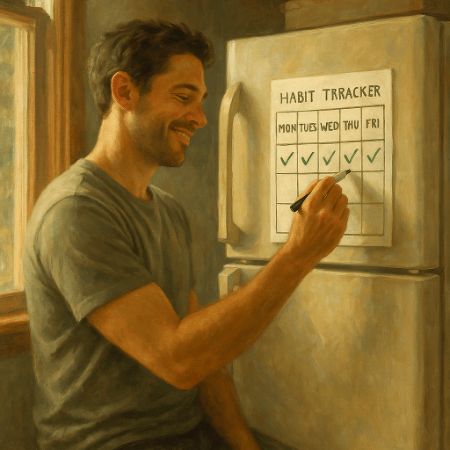Want to know what separates people who reach their goals from those who just wish they could?
It’s not luck or crazy talent—it’s the power of discipline and consistency.
High achievers don’t wake up magically motivated every day. They put in the work, building self discipline skills just like any other muscle.
Finally Finish What You Start
You don’t need more information. You need the accountability to execute.

You can do this too.
So if you’re ready to make real change, let’s dive into five daily practices that you can start using today.

Mastering Discipline and Consistency (Even If You’ve Tried and Failed Before)
Maybe you’ve tried to transform your life before. You set goals, you start strong, and then…life happens, motivation fizzles, and suddenly your “no snacks after 8pm” rule is just a faint memory.
Sound familiar? Yeah, most of us have been there (myself included).
But here’s the thing: mastering discipline and consistency isn’t about perfection or superhuman willpower. It’s about stacking small, daily wins so you stay on track—even after a setback.
And once you have these self discipline habits locked in, everything gets easier—and the results really start to stack up.
Why Discipline and Consistency are Your New Best Friends
First, let’s clear something up: discipline and consistency aren’t just for corporate overachievers or fitness fanatics.
They’re the foundation for making progress in anything you care about, whether that’s fitness and physical health, finances, learning a new skill, or just becoming the best version of yourself.
Research from the American Psychological Association shows that self-control (yep—that’s discipline in action) is linked to better physical health, higher savings, and improved overall well-being.
And consistency? That’s how you keep showing up, even when your motivation is on vacation.
Discipline vs. Consistency: What’s the Real Key Difference?
Okay, let’s put these two contenders side-by-side:
- Discipline is the ability to make yourself do what needs to be done, even when you don’t feel like it.
- Consistency is your commitment to repeat that behavior regularly, so it becomes a lasting habit.
You need self discipline to start—and consistency to keep going.
Think of discipline as hitting the gas pedal, while consistency is keeping the car moving, even when traffic slows you down.
They work together to ensure consistent progress so get you to your destination. (Trust me, I’ve had to remind myself of this during plenty of early morning wake-ups.)

Cultivating Discipline and Consistency: 5 Surprisingly Simple Daily Practices
Ready for some real-world guidance to turn discipline and consistency into your daily sidekicks?
Let’s get into the five practices that might surprise you by how simple, and yet powerful they are for achieving success.
Practice 1: Develop Discipline by Giving Your Day a Clear Mission
Start each day by deciding what you actually want to accomplish—not a wishy-washy list, but a true mission. Without this, your day gets hijacked by whatever pings, notifications, or drama land in your lap.
- Write down your top three priorities every night so they’re ready for you to review in the morning.
- Ask yourself: “If I only do these, will today feel like a win?”
- I like to scribble mine on a sticky note and slap it on my desk—it’s painfully hard to ignore!
This little ritual has a powerful ripple effect: you get clarity, direction, and a daily reminder of what really matters. (Check out James Clear’s advice on focusing on your top tasks if you want more on this.)
Practice 2: Self-Control Bootcamp: Master Your Mornings
How you start your day shapes everything that comes after. If you’re rolling out of bed straight into emails or social media scrolls, you’re letting the world set your agenda.
Instead, craft a short morning routine you can actually stick to.
- Wake up on time (without negotiating with your alarm clock, even if it puts up a good fight).
- Move your body, even if it’s just some light stretching.
- Do one thing for your mind: journal, read, or breathe.
Check out this article I wrote for some self care ideas that you can add into your mornings.
I’ve found that when I start my day on purpose, it’s a lot harder for it to run off the rails. If you want some science to back this up, Forbes has a fantastic piece on the benefits of a strong morning routine.
Practice 3: Consistent Self Discipline Through the Magic of Small Wins
Big, dramatic changes are tempting, but it’s the tiny victories that keep you motivated and moving forward.
Research by BJ Fogg (Stanford behavior scientist) proves that small positive habits, done daily, snowball into major results.
- Pick a micro-habit (e.g., meditate for 2 minutes, not 20).
- Celebrate each win, no matter how small.
- Stack your micro-habit onto something you already do (like brushing your teeth).
Personally, nothing feels better than ticking off a habit tracker—even if it’s just for a 60-second win. Consistency compounds, and suddenly, you’re doing the “hard stuff” effortlessly.
Practice 4: Cultivating Discipline: Doing Hard Things (Even When Netflix Sounds Better)
Let’s be honest—sometimes the couch calls out like a siren song. The trick? Build the muscle of doing difficult things on purpose.
- Start with one “hard” thing each day: could be a workout, a difficult call, or tackling a dreaded project.
- Set a timer for 10 minutes and just begin. You’ll probably keep going.
- Remind yourself: discomfort now equals pride later.
I like to think of self discipline as mental weightlifting—the more reps you get in, the easier it becomes to say “no” to easy distractions.
Need some extra motivation? Mark Manson’s piece on simply starting is a great read when you’re feeling stuck.
Practice 5: Keeping Your Consistency Alive with Daily Reflection
Finally, don’t let your progress happen on autopilot. Take a few minutes each evening to reflect.
- What did you do well today? Where did you slip up?
- How will you tweak things tomorrow?
- Jot it down in a notebook or your phone.
Reflection turns random effort into continuous improvement and consistent self discipline.
I’ve noticed that when I skip this, my habits tend to go on cruise control—and not always in the direction I want.

Maintaining Consistency: Stop Waiting for Monday (Seriously, Stop)
You don’t need a fresh Monday, a new month, or an unblemished planner to get started. The best time to improve your discipline and consistency? Right now.
Stop bargaining with yourself that tomorrow or “the first of the month” will be easier. It won’t.
Life is always a bit messy, which is why daily practices work—they fit real life, not just the highlights reel.
Why “Someday” is a Terrible Strategy for Maintaining Consistency
“Someday” is a slippery excuse. It keeps you exactly where you are. Instead, make today’s choices count—even if you only do them for five minutes.
Consistency is built today, not someday.
Practical Steps: Routines That Even Your Future Self Will Thank You For
- Anchor new habits to existing routines—pair that glass of water with brushing your teeth, or meditation with your morning coffee.
- Build in accountability. Tell a friend, hire a coach, or use an app that nudges you.
- Be gentle with yourself on the days you flop—progress isn’t a straight line.
My own future self has sent me many thank-you notes for routines I started on perfectly ordinary days (and yes, for forgiving myself when I missed a day, too).
Achieving Goals: How Daily Discipline and Consistency Pay Off Big Time
If you’ve ever wondered why some people crush their goals while others spin their wheels, here’s what actually moves the needle: showing up day after day, no matter what life throws at you.
It’s also been called The Slight Edge, which is a fantastic read, by the way.
Align Your Habits with Goals (and Stop Wondering Why You’re Not There Yet)
You can have well-written goals, but if your daily actions don’t line up with them, you’ll always feel stuck in reruns.
Audit your habits. Are they supporting what you want, or getting in the way?
I’ve worked with plenty of clients who quickly realized there was a gap between what they said was important, and what they actually did each day.
Close that gap and watch your progress take off.
Track Your Progress: Because What Gets Measured, Gets Improved
It’s simple, but powerful: if you keep track of your actions, you get better—whether that’s jotting a checkmark on a calendar or using your favorite app.
- Review your wins and misses weekly.
- Adjust your habits based on what worked.
- Celebrate how far you’ve come (this is your permission to brag a little!).

Warning: This Coaching Call Might Actually Change Things
Discipline and Consistency Are Learnable. Let’s Train Them Together.
If you’re tired of starting over, falling off track, or feeling stuck in the cycle of “almost,” coaching could change everything.
This isn’t about being perfect—it’s about becoming consistent.
Schedule a complimentary coaching call and let’s build momentum that lasts.
FAQ: Building Discipline and Staying Consistent
What is the difference between discipline and consistency?
Discipline is doing what needs to be done—even when you’d rather be scrolling or snacking. Consistency is doing it again tomorrow. Think of discipline as the spark, and consistency as the fuel that keeps the fire going.
How do I stay consistent when I feel unmotivated?
Let’s be honest—motivation is flaky. Build routines that don’t rely on it. Use visual cues, habit trackers, and tiny commitments that are so easy you can’t say no. Make it harder to avoid action than to take it.
Why is self discipline so hard to maintain?
Because your brain wants comfort, not challenges. Self discipline is like a muscle—it gets tired. Cut down decision fatigue, set your environment up for success, and forgive slip-ups. It’s not about perfection—it’s about persistence.
Can I build discipline and consistency at the same time?
Absolutely. In fact, they work better together—like coffee and mornings. Start tiny, keep showing up, and don’t wait for a magical Monday. Momentum builds from regular, imperfect effort.
How long does it take to develop discipline?
It varies, but studies suggest 21 to 66 days. Translation: longer than you want, but shorter than you fear. The more your habits feel like “you,” the easier it gets to stick with them.
What are some daily habits that build self control?
Wake up at a consistent time. Plan your day before your inbox ambushes you. Move your body. And yes—do one hard thing before lunch. These habits build grit one choice at a time.






